

How the ‘Contract Cheating’ Industry Has Gotten More Aggressive in Recruiting Students. This is the first of a three-part series on the “cheating economy.”
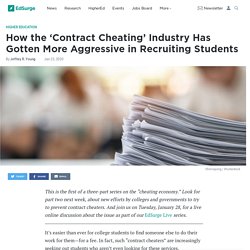
Look for part two next week, about new efforts by colleges and governments to try to prevent contract cheaters. And join us on Tuesday, January 28, for a live online discussion about the issue as part of our EdSurge Live series. It’s easier than ever for college students to find someone else to do their work for them—for a fee. In fact, such “contract cheaters” are increasingly seeking out students who aren’t even looking for these services. While companies that offer to sell students “custom term papers” are nothing new, college leaders say that the shadowy industry has become more aggressive at recruiting students as customers, using a mix of social media, direct email and even parties.
“The number of actors in this space has proliferated,” says Douglas Harrison, vice president and dean of the school of cybersecurity and information technology at the University of Maryland Global Campus. Using Evidence Effectively. Instructors have read far too many research essays in which students found an insightful quotation or nugget of information from an outside source, dropped that nugget into one of their paragraphs… and then left it there untouched, hoping that readers will just intuitively know why it's relevant.
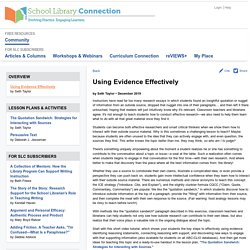
Classroom teachers and librarians agree: it's not enough to teach students how to conduct effective research—we also need to help them learn what to do with all that great material once they find it. Students can become both effective researchers and smart critical thinkers when we show them how to interact with their outside source material. Why is this sometimes a challenging lesson to teach? Maybe because students are often unused to the idea that they can actively engage with, and even question, the sources they find.
This writer knows the topic better than me, they may think, so who am I to judge? MLA Citation Taylor, Seth. Lacking Research Skills, Students Struggle. School Librarians Can Help Solve the College Readiness Gap. The Key To Teaching College-Level Research.
School Library Connection Adding Friction. A Preservice Librarian Asks How Can I Teach Triangulation Effectively. Free Technology Curriculum from Google - Applied Digital Skills. Free Technology Curriculum from Google - Applied Digital Skills. Google Applied Digital Skills Review for Teachers. The Google Applied Digital Skills curriculum is great for teachers updating an old-school computer skills class.
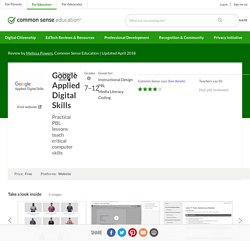
With an emphasis on creativity, collaboration, and personal interests, this ISTE-aligned curriculum really focuses on modern technology skills. In recent years, digital citizenship and coding skills have gotten a lot of airplay, and for good reason, but often at the expense of some other critical tech skills. Google Applied Digital Skills strives to address college- and career-ready skills, plus life skills like planning a vacation, hosting an event, and making a budget. The pace may be a little fast for some learners, though students can repeat modules, or teachers can develop extension activities. The video tutorials are simple but well-made, and they're hosted by a diverse group of personable instructors. How to Help Learners Build Solid Research Skills for Life. Literacies for Research: Teaching Students How to Research Successfully in a Digital Landscape - Google Slides. An open access resource for faculty and librarians.
Mind Over Media: Analyzing Contemporary Propaganda. MoM Complete Curriculum.
Online Research Model. Use tabs above to access Online Research Models & Slam Dunks for each level and subject.
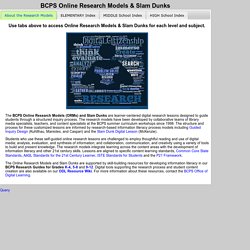
The BCPS Online Research Models (ORMs) and Slam Dunks are learner-centered digital research lessons designed to guide students through a structured inquiry process. The research models have been developed by collaborative teams of library media specialists, teachers, and content specialists at the BCPS summer curriculum workshops since 1998. The structure and process for these customized lessons are informed by research-based information literacy process models including Guided Inquiry Design (Kuhlthau, Maniotes, and Caspari) and the Slam Dunk Digital Lesson (McKenzie).
Students who use these self-guided online research lessons are challenged to employ thoughtful reading and use of digital media; analysis, evaluation, and synthesis of information; and collaboration, communication, and creativity using a variety of tools to build and present knowledge. Research Model - Millard North High School. Grades 9-12 Research Guide HOME. Last updated: August 2016 BCPS K-12 Research Guides, Copyright 2014, Baltimore County Public Schools, MD, all rights reserved.
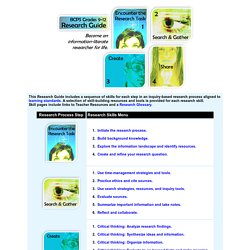
BCPS Research Guides may be used for educational, non-profit school use only. All other uses, transmissions, and duplications are prohibited unless permission is granted expressly. The Baltimore County Public schools does not guarantee the accuracy or quality of information located on telecommunications networks. We have made every reasonable attempt to ensure that our school system's web pages are educationally sound and do not contain links to any questionable materials or anything that can be deemed in violation of BCPS Policy. DIF Research Model Presentation by Dorothy Corrigan on Prezi. LOCK Model Research Process by Breyah Jones on Prezi.
General. Notetaking. Outlining. Plagiarism. RESEARCH - Topics. SCHOLAR. SEARCH ENGINES. Searching/Finding Sources. Evaluating Sources & Website Credibility. Www.pewinternet.org/files/old-media//Files/Reports/2012/PIP_TeacherSurveyReportWithMethodology110112.pdf. Pew Report How Teens do Research in the Digital Age.
Inside Search. Beginner's Guide to Research.